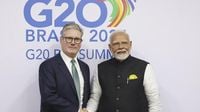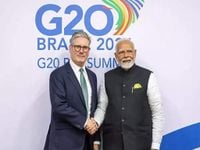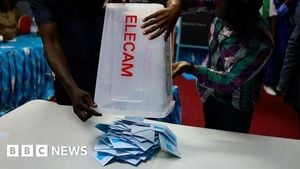India and the United Kingdom have finalized a historic Free Trade Agreement (FTA) that promises to significantly enhance bilateral commerce and create new job opportunities for both nations. Announced on May 6, 2025, the agreement was hailed by Indian Prime Minister Narendra Modi as a "historic milestone" and described by UK Prime Minister Keir Starmer as a "landmark trade deal" that will benefit both countries economically.
The FTA, which follows a series of negotiations that began in January 2022, aims to eliminate tariffs on 90% of traded goods, with 99% of Indian exports set to benefit from zero duties. Currently, the bilateral trade between India and the UK stands at approximately $60 billion, and the agreement is expected to double that figure to $120 billion by 2030.
As part of the deal, the UK will eliminate tariffs on key Indian exports, including textiles, leather, engineering goods, and various agricultural products. Indian tariffs on UK goods such as whisky, gin, and automobiles will also see significant reductions. Specifically, tariffs on whisky and gin will be halved from 150% to 75%, and then further reduced to 40% over the next decade. Automotive tariffs will drop from over 100% to 10% under a quota system.
Prime Minister Modi emphasized the significance of the agreement during a phone call with Starmer, stating, "In a historic milestone, India and the UK have successfully concluded an ambitious and mutually beneficial Free Trade Agreement, along with a Double Contribution Convention." He added that these agreements will deepen the Comprehensive Strategic Partnership between the two nations, catalyzing trade, investment, and job creation.
The Double Contribution Convention, a critical aspect of the FTA, exempts skilled Indian workers employed in the UK from paying social security contributions for three years. This provision is expected to save Indian service providers approximately 20% of salaries, benefiting over 60,000 employees in the IT sector alone. The total benefits to Indian companies and employees are projected to exceed ₹4,000 crore.
While the deal has been broadly welcomed, some sectors have raised concerns. The Indian alcohol beverage industry has expressed fears that the agreement may not fully address their interests, particularly in relation to potential future agreements with the US and EU that could further impact local businesses.
In addition to the tariff eliminations, the FTA is expected to open up significant export opportunities for labor-intensive sectors such as textiles, marine products, leather, footwear, sports goods, toys, gems and jewelry, and organic chemicals. The agreement is seen as a pathway for Indian exporters to compete more effectively against nations like Bangladesh, which currently benefit from lower tariffs in the UK.
Starmer highlighted the economic implications for the UK, stating that the deal represents the largest trade agreement since Britain exited the European Union in 2020. He noted, "Fantastic news for British business, British workers, and British shoppers, delivering on our Plan for Change." The UK government anticipates that the FTA will contribute approximately £25.5 billion to the UK economy and create new job avenues.
However, the negotiations were not without challenges. Key sticking points included rules of origin and short-term service visas, which were resolved as discussions progressed towards the conclusion of the FTA. The UK’s carbon tax has also been a concern for Indian exporters, particularly in the metal products sector, leading India to propose a rebalancing mechanism to address potential losses due to regulation.
The agreement has garnered support from various business leaders and trade organizations in both countries. The Confederation of Indian Industry (CII) welcomed the FTA, stating it reflects a shared commitment to deepening economic ties and fostering a business-friendly environment. Similarly, Richard Heald, chair of the UK-India Business Council, remarked that the trade deal "reflects the deep trust, shared values, and mutual ambition" that define the bilateral relationship.
As the legal text of the agreement is formalized, it will require approval from the British Parliament before implementation. This FTA is expected to set a precedent for India as it seeks to negotiate similar agreements with other nations, including the US, the European Union, and several Latin American countries.
Overall, the India-UK Free Trade Agreement represents a significant step forward in strengthening economic relations between two of the world’s largest democracies. Both nations are poised to reap substantial benefits from this landmark deal, which aims to enhance trade, investment, and job creation while addressing the evolving global economic landscape.






